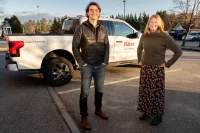
Three local farms profiled by Bates students
Fifteen students studying farming practices in an environmental studies course at Bates College offer research profiles of three local farms at 1 p.m. Wednesday, Dec. 4, in Chase Lounge, 56 Campus Avenue. This presentation by the Program in Environmental Studies at Bates is free and open to the public.
The students, participants in the “World Agriculture” course taught by Peter Rogers, will present their findings from research into the operations of Nezinscott Farm, Turner; Avalon Farm, North Yarmouth; and Bell Farms, Auburn.
Each of the farms demonstrates a different agricultural model. Nezinscott Farm, well-known in Maine as an organic operation, practices biodynamic farming that minimizes the use of outside “inputs,” such as fuel and chemical fertilizers, through intensive recycling.
Avalon Farm is a part-time operation specializing in “heritage” livestock whose proprietors, Linda and Scott Routhier, also hold jobs off the farm. (The Routhiers will be present at the Bates event.) Bell Farms exemplifies the changing model of mainstream farming, as it seeks to cut out the middleman in marketing commodities to large-scale retailers such as Wal-Mart.




